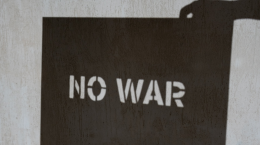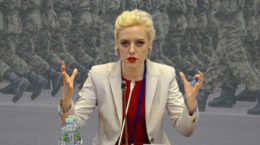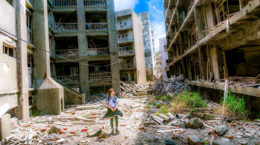On June 15, Ukrainian President Volodymyr Zelenski ordered a check near the border with Belarus on the possible threat of a new invasion from the north. But experts assess the likelihood of an invasion as unlikely because Belarusian soldiers do not want to fight in Ukraine, and Belarusians, even those who support Lukashenka, are against the war. To voice their position against going to war, soldiers run away from military units. Often they are caught, criminal cases are filed, and the cases of escape are hushed up. Vlad (name changed), 18, is one of those who managed to make it to the European Union.
— As we remember, the active phase of the war in Ukraine, which has lasted nearly eight years, began on February 24. How many months did you serve at that time, and what were you able to do?
— I was summoned for military service in the autumn and had no opportunity to refuse. By February 24, my service was only four months, I had time to take the oath and did not even know how to handle a gun, I only fired a couple of times. We mostly went on marches and practised tactical tasks a couple of times. We also listened to many ideological lectures, about Europeans – enemies and Nazis, that the occupants used the white-red-white flag during the war, that anyone who supports the opposition should be shot. Most of the boys were asleep at such lectures. We were also sent to different military brigades as helpers. Two weeks before February 24, I was sent to another military unit.
— How did you find out that Russia’s war in Ukraine had started? And how did you feel that day?
— We were informed about the war by an officer. I didn’t believe it was possible, I couldn’t imagine that there would be a large-scale war, and I thought that Russia and Ukraine would quarrel and then make peace. When we went to other units before the war started, I saw that Russians were bringing in trains of tanks, howitzers, BMPs, unloading ammunition, I saw military trucks from Russia. We were told that it was all for exercises, but it seemed strange to me to move so much equipment to train for a fortnight. And on February 24, my comrades-in-arms and I watched a video of strikes against Ukrainian units and military facilities. I didn’t understand how such a thing was possible, and frankly, I thought Ukraine would be overrun quickly. That day we thought Belarus would go to war, and there was unrest among the soldiers, especially when the “high readiness” command, given in the case of war, was sounded. The commander issued all weapons, some with live ammunition. There were about 500 more people in the unit, and I thought I was going to war. But then things somehow calmed down.
— It was from Belarus that the first strikes on Ukraine were launched. Did you see how it happened?
— We were at the border, where our task was to guard the Russians at the firing range from which military planes were taking off for Ukraine. The place was close to the Ukrainian border, and I saw the pilots flying the planes and the equipment taking off to the south. But I couldn’t take any pictures or videos: phones were forbidden and if noticed, the soldier would be sent to the brig.
— When did you realise you had to run away from the army?
— When we were in an exercise on the border with the European Union. Two factors had an impact: the proximity of the border and the attitude of the officers. If before I had planned to endure these 1.5 years with clenched teeth, now it became obvious that I would not be able to do so. My suspicions grew that there would be war, and I thought: why would I fight for these people, for this treatment like cattle?
— In what way was it expressed?
— A private could be insulted and humiliated by any officer. One time at the range, the superiors were drinking, and a drunken officer kicked me in the back because he thought I was looking at something on my phone. There was also a case of a punch in the shoulder from a senior officer. There is hazing in the army, and officers are aware of it, they say it’s bad, but they don’t do anything about it. Soldiers bully each other, especially the NCOs who have minimal authority. They make you shave your head, don’t allow you to keep your hands in your pockets – if you do that, it is considered too much. There are shifts where you sleep four hours a night only with the sergeant’s permission. There were cases when a soldier did not want to obey, and then, the sergeant let him sleep only 15 minutes for the whole day. It is disturbing that the rank of sergeant is given out at random, and adequate guys have never been given it.
— How did you prepare for your escape? What was going on the day you left Belarus?
— I started preparing a week in advance. I found a map of the area, found out which road to take, and planned what time of day I would run. I chose the morning time when everyone would still be asleep, so I figured I would have a couple of hours of a head start. When I was getting ready to escape, I knew that it was possible to get asylum on EU territory, and I thought it was a mission that had to be accomplished because I could no longer stand it mentally. I changed my uniform, left my weapon with live ammunition on the way, and left my phone. I got a lift to the border from a truck driver who did not ask me anything, which I consider lucky. I had to climb several fences. The first was a steel one with wires and blades. The camera picked me up there, and I realised there was not much time. While climbing over the fence, I got a small injury and fell to the ground. Then there was a fence over the ditch, and I was able to climb under it. The next fence had rotted posts, and I broke it. Then I understood I was already over the border and went to surrender.
— How were you received in the European Union?
— The border guards were shocked and did not believe I had escaped from the army. The special services came and questioned me for a very long time. I honestly told about border crossing, confirmed that Belarus was indirectly involved in the war, about the deployment of equipment. Then we came to the migration service. I could not believe that I had succeeded, that I was safe. My feelings were very strong, the realization came that I would not go home soon and would not see my relatives for a long time yet. I am now in a refugee camp, waiting for asylum and permission to find official employment. Compared to the army, the camp is completely free.
— How did your relatives react to your escape? Did officers try to influence them after you left your unit?
— The military, police and KGB came home. They told me that I would not be punished if I returned, that I could finish my service. Under the pressure, my relatives called me and persuaded me to come to Belarus. But I understood: if I did that, I could face up to 20 years in prison and be sentenced for terrorism and extremism because I was running away with a gun. Now the pressure on my relatives has gone down.
— And what is the situation in the Belarusian army? How many soldiers, officers agree to go to war with Ukraine?
— Most guys do not want to go to war with Ukrainians. A Belarusian soldier has no motive: why would he kill a Ukrainian soldier or a Ukrainian civilian? But soldiers are expendable material, cannon fodder, they just obey the order of a senior officer, and there is very little choice. For disobeying an order, 8 to 15 years await, which means the soldier has to kill, either sit in prison or run away. Most conscripts have views like mine because they are young and want to live, not die. They understand that war will bring Belarusians nothing but pain, death and killing. Maybe some want to fight, but they are few. The officers I talked to have the same attitude. They have families and children and don’t want to risk their lives to go home in a zinc coffin.
Vlad’s account of what was happening in Belarus before and after the war confirms it: Belarus is an occupied country. Besides, we were once again convinced that Belarusian soldiers do not want to join the war because they want to live and not be killed for the interests of dictators Lukashenko and Putin. There is already one Belarusian prisoner of war — a pilot who surrendered to the Ukrainians along with his aircraft. His fate is still unknown. We must keep on saying that Belarusians are against the war and save our soldiers.









